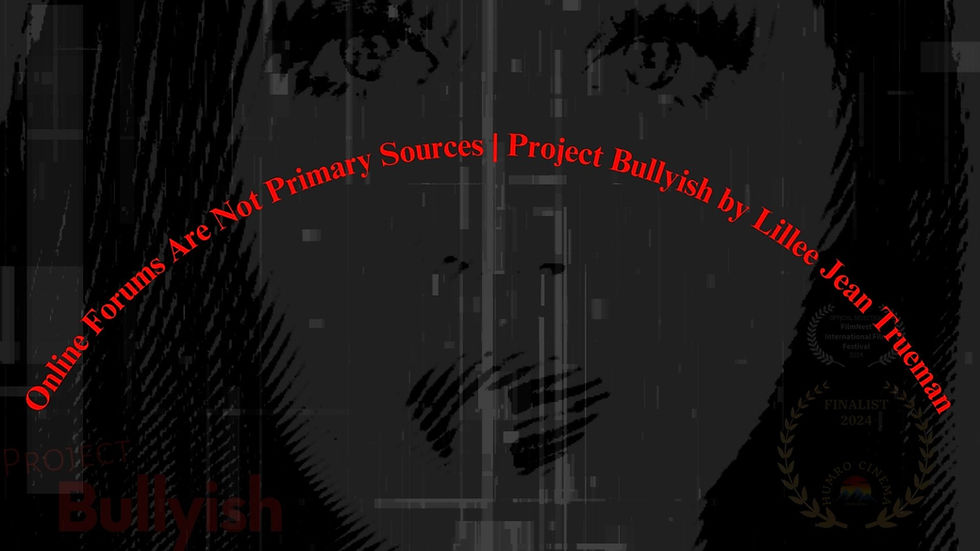Lillee Jean Cyberbullying Project: Bullyish Advocacy | Effects Outside the Screen 2022
- Lillee Jean
- Aug 2, 2022
- 4 min read
Cyberbullying often times is discussed as "not a big deal." Victims are often told, "just get off the internet". These statements in question are misguided, however, they serve as a catalyst for the change that must be made. It is important not to look down on each other, but to empower, encourage, and educate each other instead.
OUTSIDE THE SCREEN
Online bullying has many effects OUTSIDE the screen. For example, online bullying can extend as far as doxxing, with the online entity contacting friends, family, and any other affiliations. A decline in mental health and quality of life can result from online bullying.
"Although cyberbullying is usually discussed as a problem of childhood and adolescence, adults, too, suffer from electronic harassment, some forms of which have been dubbed “flaming” (broadcasting offensive messages), “outing” (disseminating embarrassing personal information), and “trolling” (posting content to trigger embarrassing online reactions)." - Elias Aboujaoude MD, MA
How Can Online Bullying Impact You?
Online is an isolating environment. From my own experiences I can dig within to say, it's difficult to discuss even today. Over the span of so many years, I was tormented online by one group, one online digital cult, connected to social media content farming corporations. The goal of this cult was simple: SEEK AND DESTROY Lillee Jean. In my documentary Project: Bullyish, the trailer, showcases a document this cult sent out called "10 Facts To Take Down Lillee Jean", as well as "THE CRUSADE OF LILLEE JEAN" (0:34). I was a teenager at the time.
"Cybervictims tend to have increased rates of depression, anxiety, and insomnia, whereas cyberbullies are more likely to have problems with outward aggression, hyperactivity, and substance use. A major concern is the increased risk of suicide, considered stronger than in traditional bullying." (Psy. Today)
The difference between online bullying and bullying:
One person can have tens of accounts, each creating lies and forming torment. In person, a person must corral; online, one can be in a group without the "people";
There is a paranormal relationship between what happens on screen and what happens in person. Words that are verbally abusive have become desensitized.;
The culture of the internet differs from that of the real world. Emojis are internet culture. Things such as the "💀" emoji, or " 🤡 " emoji, in the context of making fun of someone, in person, would have the abuser never uttering the words "you're a clown", or "you're dead". Online they have no issue utilizing these in a demeaning way. They find strength in their online personas. In contrast to their online personas, abusers often appear meek in person.
Online bullying often pushes the limits. It's an adrenaline rush. In-person someone might not say "kill yourself". Online "KYS", is far too frequently used, and directed at someone is not only verbally abusive but, a form of digital bullying.
You cannot ignore online bullying. Radicalized black websites, or message boards, can spread sensitive information to dangerous groups. In person, you can see your enemy. In the online world, they are just anonymous names. A victim of these anonymous names, however, may suffer severe consequences such as wage loss, loss of privacy, loss of digital civil rights, or even worse, someone who becomes radicalized may do something foolish. People you don't even know, nor would know in a normal day's life.

What Can You Do?
What can you do to stop cyberbullying? It's simple. Be educated, and spread that wealth of knowledge forward. Online bullying education is flooded with radicalized ideas thanks to the internet. Children are exposed to these ideas, and, share them with one another. The "it isn't that bad" adage must be stopped. Psychologists, by definition, consider the following: "cyberbullying refers to the use of new digital technologies with the intended purpose of inflicting harm on others." (Psychology Today).
The most vulnerable are our youth. It is clear that manipulative marketing has taken place in social media communities, as I discussed in my previous piece (click here), which shows how content farms have secretly placed themselves "amongst the people", to spread rumors, and make money.
'Drama' and 'tea' videos target children with deceptive, yet appealing content. The importance of educating our youth about online platforms, and protecting them, cannot be overstated.
"Help restore their self-esteem and become more resilient by including them in the process of advocating for themselves after the cyberbullying has occurred. Help them understand that it is not their fault and that the bully has the issue not them." - Dr. Tenille Richardon-Quamina
ADVOCATE. EDUCATE.
The internet is changing. It's time for laws to change with the times.
"The truth is, with knowledge, does indeed come power. As a result of several videos I discovered that were likely expended upon (see here for my op/ed on Cyberstalker), it made me realize. These videos seem "too polished", or, as if they were manufactured. All videos were posted at a specific time, date, and all utilized the SAME tags. Deepen your thinking. Are there any people who use "sub bots" in a normal sense? "Instagram vs reality". What about 4chan? A dark website (source). Kiwifarms (source). Or lolcow? Both known websites to doxx, harass, defame, and also be the root of many recent shootings. This seemed deeper than I ever imagined. It was a business. My stalker, who formed a cult modeled after the Unicole cult...was terrifying connected and set up in order to harm me for years. "




Comments